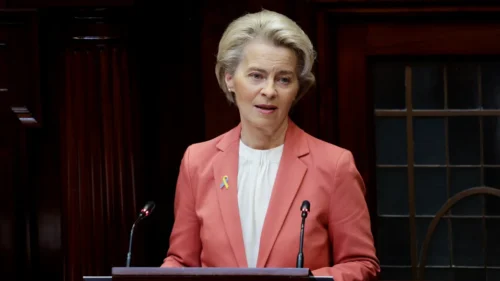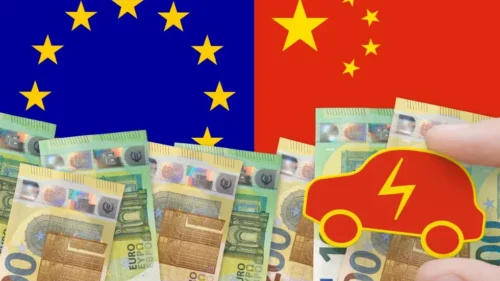Germany’s ruling coalition has crumbled, sending shockwaves through Berlin and beyond. The so-called traffic light coalition, named for its three member parties — the Social Democrats (SPD; red), the Free Democrats (FDP; yellow) and the Greens — has ended in acrimony. Chancellor Olaf Scholz, head of the SPD, dismissed his Finance Minister Christian Lindner, a member of the FDP, over irreconcilable policy disputes. In response, Lindner and all but one FDP minister resigned from their posts, leaving the government without a majority. The coalition, once a pillar of stability in European politics, has fallen apart. Now, a vote of non-confidence has been scheduled for December 16, to be followed by new elections on February 23, 2025.
The budget battle that broke the camel’s back
Scholz is scrambling to save face amid approval ratings that have plunged to an unprecedented low of 14%. The SPD’s own approval ratings are similarly abysmal.
Polls of voting intentions show the party now tied with the far-right Alternative for Germany (AfD) at around 16% — a dramatic drop from the SDP’s 26% support in the last election. The FDP faces even bleaker prospects, polling around 3–4%, just below the 5% threshold needed to enter parliament.
While tensions within the coalition were no secret, the breaking point came when a proposal by Lindner leaked. The 18-page document “Turnaround Germany – A Concept for Growth and Generational Justice” suggested cutting financial aid to low-income families and refugees, which panicked the SPD and Greens.
The election of Donald Trump as the next US president has raised fears the US will soon cut its support for Ukraine, forcing Germany to pick up the tab or risk the defeat of Ukrainian forces. Lindner claims he was pressured to agree to another suspension of the debt brake. He refused, afraid of embarrassment by the constitutional court. Scholz floated the possibility of new elections, which Lindner leaked to Bild while parties were still deliberating. This was the final straw for Scholz, who asked for Lindner’s dismissal.
The economic headwinds Germany has been facing only add to the drama. Budgets crafted on the assumption of GDP growth that never materialized have left government departments strapped. Austerity measures have strained even the nation’s soft power as cultural icons like the Goethe Institute have been forced to close German schools abroad.
Related Reading
The crux of the budgetary deadlock is Germany’s “debt brake,” a constitutional limit capping new debt for structural deficits at 0.35% of GDP. While this debt brake was suspended temporarily during the pandemic and the Ukraine invasion, it has since snapped back into force, severely restricting the government’s freedom of action.
Who stands to gain?
With elections likely in early spring, Germany’s political map could shift drastically. The center-right Christian Democrats (CDU/CSU), currently polling at 33%, are poised to regain power, though their numbers fall short of a parliamentary majority. A coalition with the Greens remains unlikely due to ideological divides, and the SPD’s recent failure makes it a dubious ally. That leaves the CDU/CSU with only a handful of feasible partners — including an intriguing, if controversial, one in the newly-formed Bündnis Sahra Wagenknecht (BSW).
BSW, led by former leftist Sahra Wagenknecht, has captivated voters disillusioned with mainstream parties but unwilling to embrace the far-right AfD. Known for her anti-immigration stance and advocacy for a negotiated settlement with Russia, Wagenknecht is a questionable candidate to offer the CDU/CSU a politically stable alliance.
It should be noted that AfD came out as the party with the most votes during recent state elections in Thuringia (34.3%, slightly ahead of CDU 33.5%). It missed to reach that goal in Saxony, but only by a hair (34.0% compared to 34.4% for CDU).
Voter discontent in Germany, especially in the former East German states, has led to a surge in support for right-wing AfD. Due to Germany’s history, politicians are very aware of the danger of fascism, but they seem rather helpless in addressing the root causes (increased unemployment in rural areas, social anxiety, xenophobia, feelings of being second-class citizens).
Financial and global implications
The collapse of the German government sends shivers through markets already sensitive to geopolitical risk. Shares of Germany’s iconic automakers — BMW, Mercedes-Benz, Porsche and Volkswagen — have fallen sharply, anticipating the return of Trump-era import tariffs on European goods. With Germany’s political attention diverted inward, “budget sinners” like Italy, France and Spain may find relief, as former members of the hard-currency block, such as Germany, have historically pressured them to meet strict fiscal criteria under the Maastricht Treaty.
So far, little or no spread widening between German and other Euro-area government debt has been observed in reaction to the earthquake in Berlin. While the German 10-year government bond yield stands at 2.4%, France and Spain pay a clear premium at 3.2%, followed by Greece at 3.3% and Italy at 3.7%. Still, Italy (135% debt-to-GDP ratio) and Greece (162%) pay lower interest rates than the UK (98%) and the US (123%). Those yields only make sense if the political will to keep the Euro area together would galvanize politicians into further bailouts of countries should the need arise.
If no stable coalition emerges, Germany faces the prospect of another election, potentially plunging Europe’s largest economy into a period of prolonged instability. A caretaker government may limp along in the interim, but effective governance and ambitious legislative agendas will be on hold.
Internationally, the political crisis could have wide-reaching effects. As Germany becomes preoccupied with its own domestic woes, European allies such as Italy and France may gain breathing room in their own budgetary struggles, potentially facing less scrutiny from Berlin on debt under the Maastricht Treaty. However, any withdrawal from a Trump-led US could leave Europe drifting in the high seas without clear leadership, missing out on a potentially generational opportunity to determine the geopolitical direction of a future Europe unshackled from US dominance.
The views expressed in this article are the author’s own and do not necessarily reflect Fair Observer’s editorial policy.
Support Fair Observer
We rely on your support for our independence, diversity and quality.
For more than 10 years, Fair Observer has been free, fair and independent. No billionaire owns us, no advertisers control us. We are a reader-supported nonprofit. Unlike many other publications, we keep our content free for readers regardless of where they live or whether they can afford to pay. We have no paywalls and no ads.
In the post-truth era of fake news, echo chambers and filter bubbles, we publish a plurality of perspectives from around the world. Anyone can publish with us, but everyone goes through a rigorous editorial process. So, you get fact-checked, well-reasoned content instead of noise.
We publish 2,500+ voices from 90+ countries. We also conduct education and training programs
on subjects ranging from digital media and journalism to writing and critical thinking. This
doesn’t come cheap. Servers, editors, trainers and web developers cost
money.
Please consider supporting us on a regular basis as a recurring donor or a
sustaining member.
Will you support FO’s journalism?
We rely on your support for our independence, diversity and quality.








Comment